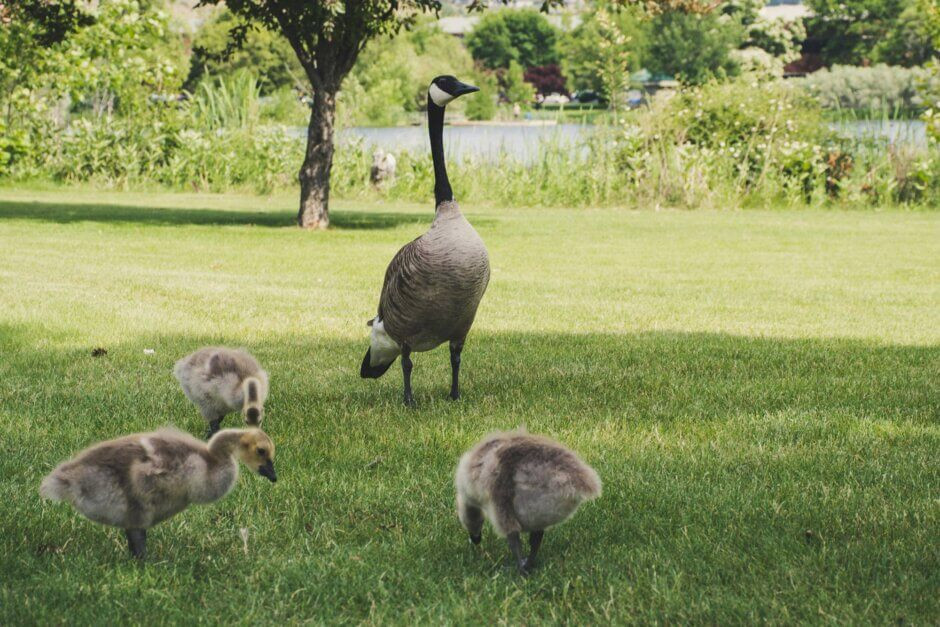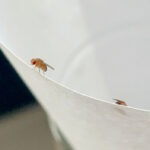If you’ve spent any time in parks, near lakes, or on golf courses, you’re likely familiar with goose poop. These droppings are a common sight wherever geese gather, often creating a messy and sometimes unhygienic environment for people and pets. Beyond the mere inconvenience, you might find yourself pondering questions like, “Is goose poop harmful?” or even, more specifically, “Do geese actually poop while they are flying?”
This article will explore the world of goose poop, answering your questions and offering crucial information. From identifying goose poop to understanding the behavior behind geese defecating mid-flight, we’ll cover everything you need to know. Whether you’re dealing with goose issues on your property or are simply curious about these birds, this guide is for you.
Decoding Goose Poop: An Overview
Goose poop is a ubiquitous presence in areas frequented by geese, such as parks, golf courses, and waterfronts. While often seen as just a nuisance, goose droppings can reveal insights about the birds and even present potential health risks to humans and animals. Understanding the characteristics of goose poop, how frequently geese defecate, and the circumstances under which they do so can help you manage and navigate these encounters more effectively.
Identifying Goose Poop: What to Look For
Goose poop typically has a tubular shape and varies in size, generally around 2 to 3 inches in length and about half an inch in diameter. These dimensions can fluctuate based on the goose’s diet and overall health. The color is usually greenish or brownish, frequently topped with a white or yellowish deposit of uric acid. The consistency can range from firm to soft, again influenced by the goose’s diet and hydration levels.
It’s important to note that the appearance of goose poop can subtly change with the bird’s diet and the season. Geese are known to be prolific poopers, particularly when they are actively feeding. On average, a single goose can defecate up to 28 times each day. This frequent excretion is a natural part of their digestive process, which efficiently processes food to support their large bodies and energy demands. In fact, a single goose can produce between 1 and 1.5 pounds of feces daily!
The Question Answered: Do Geese Defecate During Flight?
Yes, geese do poop while flying. This phenomenon is quite noticeable when large flocks are flying overhead, often leaving droppings behind them. This behavior is common among many bird species and is a natural consequence of their digestive systems working continuously, even when they are airborne. However, it’s important to note that geese are significantly more likely to poop while on the ground compared to when they are in the air. Flying requires considerable energy and muscle control, and while their digestive system continues to function, the act of defecation is not exclusive to being grounded.
 A serene park scene featuring a Canada goose family with goslings, highlighting the common areas where geese congregate and potentially create goose poop.
A serene park scene featuring a Canada goose family with goslings, highlighting the common areas where geese congregate and potentially create goose poop.
Health Risks Associated with Goose Poop
Goose poop is more than just an aesthetic problem; it can have real health implications for humans, dogs, and other animals. While it’s a natural byproduct of geese, their droppings can harbor harmful bacteria and parasites that pose risks upon contact. Goose poop can be toxic to humans and presents a particular concern for dogs, especially since many dogs are inclined to eat it. The reasons behind this canine behavior are not fully understood, but theories range from nutrient deficiencies to simple attraction to the smell and taste. Regardless of the reason, ingesting goose poop can lead to health issues in dogs, as it can contain parasites and bacteria that cause digestive upset, vomiting, diarrhea, or even more serious infections.
The dangers of goose poop extend to other animals as well, especially those that graze or forage on contaminated grass or water. Farm animals like cows and sheep can ingest harmful bacteria or parasites from goose droppings, potentially leading to infections or illnesses. These diseases can be transmitted between animals and even to humans, emphasizing the importance of prompt cleanup of goose droppings and avoiding direct contact.
Several diseases are commonly linked to goose poop, including:
- Histoplasmosis: A fungal infection affecting the lungs, caused by inhaling spores from contaminated droppings.
- Giardiasis: A parasitic infection caused by Giardia, leading to severe gastrointestinal symptoms.
- Cryptosporidiosis: Another parasitic infection that can cause diarrhea, stomach cramps, and nausea.
Environmental Impact of Goose Poop
When geese congregate near bodies of water like lakes, rivers, or ponds, their droppings contribute to increased nutrient levels, particularly nitrogen and phosphorus. This nutrient enrichment can disrupt delicate aquatic ecosystems. These excess nutrients can trigger algal blooms, which block sunlight, inhibiting photosynthesis and harming underwater plants. The decomposition of these plants leads to a reduction in oxygen levels in the water, which can be detrimental to fish and other aquatic life.
While goose poop contains nutrients that can be beneficial for plant growth, its concentrated deposition often causes more harm than good. Excessive droppings can lead to nutrient imbalances in the soil and attract unwanted pests, diminishing its value as a fertilizer. Overall, the environmental impact of goose poop is largely negative, particularly concerning its effects on water quality and ecosystem health.
Managing Goose Poop on Your Property
Effectively managing goose poop on your property involves a combination of preventative measures and regular maintenance. To keep your lawn and garden free from droppings, consider implementing effective goose deterrents. These can include visual deterrents, noise-making devices, liquid repellents, or physical barriers to discourage geese from settling on your property. Regular cleanup of any droppings is also crucial for maintaining a healthy environment. Use a shovel to collect droppings and dispose of the waste properly to prevent contamination of nearby water sources. By combining deterrent strategies with consistent cleanup, you can protect your property and foster a cleaner, healthier outdoor environment.
Preventing Goose Poop Buildup
Keeping your property clear of goose poop can seem like a continuous battle, but with the right knowledge and resources, it’s possible to minimize the problem. Utilizing preventative measures to deter geese from your property in the first place is key to reducing the accumulation of droppings. Products like Avian Migrate offer a proactive solution by deterring geese from approaching your property, thus preventing your lawn from becoming a target for bird droppings. Applying Avian Migrate to your yard can provide weeks of protection. For more information or to purchase, call 888.868.1982, or shop online today.
Everything You Should Know About Goose Poop
